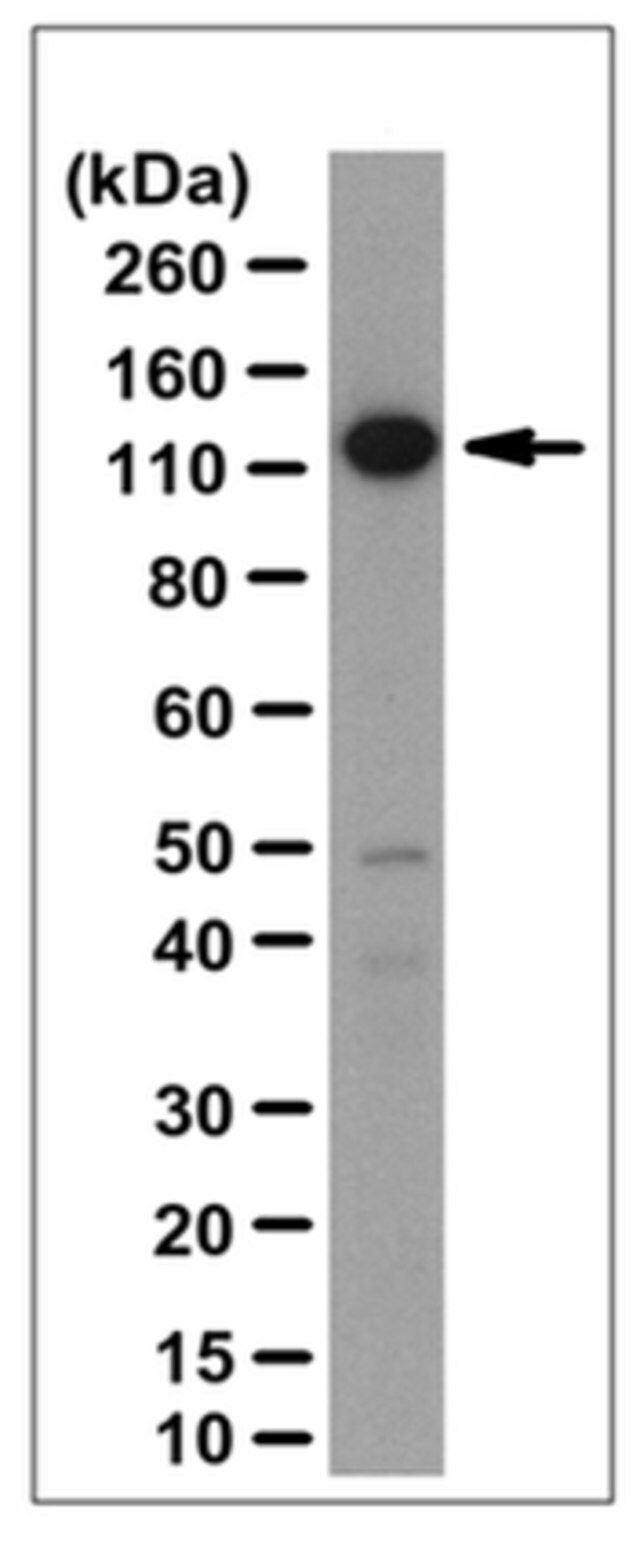您的位置:首页 > 产品中心 > Anti-Exportin-1/CRM1 Antibody
Anti-Exportin-1/CRM1 Antibody

产品别名
Anti-Exportin-1/CRM1 Antibody
Exportin-1, Exp1, Chromosome region maintenance 1 protein homolog, Exportin-1/CRM1
基本信息
| eCl@ss | 32160702 |
| General description【一般描述】 | Exportin-1 (UniProt O14980; also known as Chromosome region maintenance 1 protein homolog, CRM1 homolog, Exp1) is encoded by the XPO1 (also known as CRM1) gene (Gene ID 7514) in human. The transport of macromolecules between cytoplasm and nucleus is mediated by importins and exportins and regulated by the small GTPase Ran. Most nuclear importins & exportins, including exportin-1, belong to the beta-karyopherin (KAP) family of proteins, Importins bind their cargoes with either nuclear localization signal (NLS) or M9 domain-containing hnRNP proteins in the cytoplasm, while exportins target their substrates via their nuclear export signal (NES) or M9 domain inside the nucleus. The energy dependence of nucleocytoplasmic transport replies on the Ran GTPase system, where the nucleotide exchange factor (NEF) RCC1/Prp20p, the GTPase activating protein (GAP) RanGAP1/Rna1p, and the Ran binding protein (RBP) RanBP1/Yrb1p are arranged asymmetrically to produce a high Ran GTP:Ran GDP ratio in the nucleus and the reverse ratio in the cytoplasm. Exportin 1/CRM1 is reported to bind RanGTP and either Rev or PKI NES peptides in a cooperative manner in vitro and exogenous expression of human CRM1 in Xenopus oocytes is shown to increase the rate of Rev and U snRNA nuclear export. |
| Immunogen【免疫原】 | Epitope: C-terminus Recombinant protein corresponding to the C-terminus of human Exportin-1/CRM1. |
| Application【应用】 | This Anti-Exportin-1/CRM1 Antibody is validated for use in Western Blotting, Immunocytochemistry, Immunoprecipitation, Electron Microscopy for the detection of Exportin-1/CRM1. Research Category Signaling Research Sub Category Signaling Neuroscience Immunocytochemistry Analysis: Representative lots detected Crm1 nuclear localization in murine blastocysts and HeLa-derived HtTA-1 cells (Fornerod, M., et al. (1997). EMBO J. 16(4):807-816), as well as elevated nuclear envelope (NE) Crm1 accumulation in HeLa cells due to nuclear export inhibition upon oxidative stress induction by diethyl maleate (DEM) treatment (Crampton, N., et al. (2009). Mol Biol Cell. 20(24):5106-5116). Immunoprecipitation Analysis: A representative lot detected enhanced Crm1 association with Nup62, Nup153, and Ran in HeLa cells upon diethyl maleate (DEM) treatment by co-IP (Crampton, N., et al. (2009). Mol Biol Cell. 20(24):5106-5116). Western Blotting Analysis: A representative lot detected reduced Crm1 level in lysates from HeLa cells upon nuclear export inhibitor leptomycin B (LMB) or oxidant diethyl maleate (DEM) treatment (Crampton, N., et al. (2009). Mol Biol Cell. 20(24):5106-5116). Electron Microscopy: A representative lot detected Crm1 nuclear localization in HeLa-derived HtTA-1 cells by EM (Fornerod, M., et al. (1997). EMBO J. 16(4):807-816). Immunoprecipitation Analysis: A representative lot immunoprecipitated Crm1 from COS-7 cell lysates (Boyle, S.M., et al.(1999). J Virol. 73(8):6872-6881). |
| Quality【质量】 | Evaluated by Western Blotting in HeLa cell lysate. Western Blotting Analysis: A 1:10,000 of this antibody detected Exportin-1/CRM1 in 10 µg of HeLa cell lysate. |
| Physical form【外形】 | Rabbit polyclonal serum with 0.05% sodium azide. Unpurified |
| Other Notes【其他说明】 | Concentration: Please refer to lot specific datasheet. |
产品性质
| biological source【生物来源】 | rabbit |
| Quality Level【质量水平】 | 100 |
| antibody form【抗体形式】 | serum |
| antibody product type | primary antibodies |
| clone【克隆】 | polyclonal |
| species reactivity | mouse, human, monkey |
| technique(s) | electron microscopy: suitable immunocytochemistry: suitable immunoprecipitation (IP): suitable western blot: suitable |
| NCBI accession no.【NCBI登记号】 | NP_003391 |
| UniProt accession no.【UniProt登记号】 | O14980 |
| shipped in【运输】 | dry ice |
| Gene Information | human ... XPO1(7514) |
产品说明
| Target description【目标描述】 | ~120 kDa observed. Uncharacterized band(s) may appear in some lysates. |
| Storage and Stability【储存及稳定性】 | Stable for 1 year at -20°C from date of receipt. Handling Recommendations: Upon receipt and prior to removing the cap, centrifuge the vial and gently mix the solution. Aliquot into microcentrifuge tubes and store at -20°C. Avoid repeated freeze/thaw cycles, which may damage IgG and affect product performance. |
| Disclaimer【免责声明】 | Unless otherwise stated in our catalog or other company documentation accompanying the product(s), our products are intended for research use only and are not to be used for any other purpose, which includes but is not limited to, unauthorized commercial uses, in vitro diagnostic uses, ex vivo or in vivo therapeutic uses or any type of consumption or application to humans or animals. |
安全信息
| Storage Class Code【储存分类代码】 | 12 - Non Combustible Liquids |
| WGK | WGK 1 |




